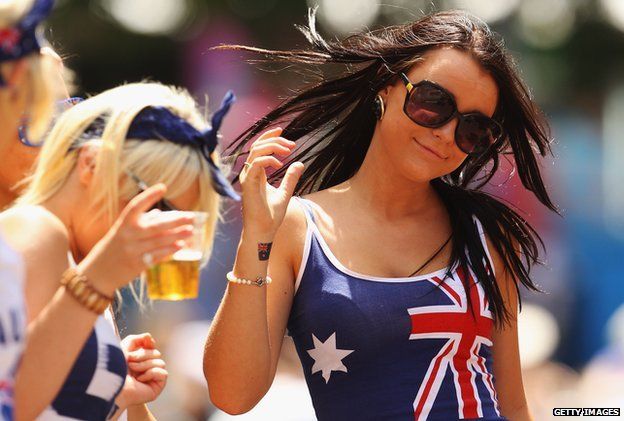Australia's new non-drinking puritans
- Published

Australia is known for its hard-drinking men and women rarely seen without a "tinny" of beer in hand, but something is changing. In some circles, ordering lemonade instead of lager is no longer seen as "soft" - it's fashionable.
Mark Hobart is a typical, urban 30-something Australian male. He and his wife work hard at their office jobs, and to unwind they will often have a few beers of an evening, or share a bottle of wine. On weekends it's generally more.
Hobart is by no means an alcoholic, but since he first started sneaking the occasional beer with his school friends aged 13, alcohol has been an ever present feature in his life.
But for most nights this past month, Hobart hasn't touched a single drop. He hasn't given up forever, but says he is trying to "change his relationship with alcohol" by actively abstaining.
"I felt like I was just drinking all the time, and I'm at a point in my life where it's probably not doing a world of good for my health, so I thought I'd just go without for a while, and see how it goes."
Hobart is part of a growing number of Australians who are rejecting the notion that not drinking is a personality flaw.
One in eight Australian adults has never had a drink, according to the National Drug Strategy Household Survey Report, double the number of 20 years ago.
The figures for teenagers tell a similar story. In 1999, more than half of all 16- and 17-year-old secondary school students reported drinking in the previous seven days. By 2011 it was only a third.
"We've still got a massive drinking problem in Australia," says Geoff Munro, the head of policy at the Australian Drug Foundation. "We've got a lot of people still regarding getting drunk as entertainment, but we've also got an undercurrent of people saying enough is enough."
One of the leaders of the abstention movement is Chris Raine, an affable 26-year-old former public school boy, who sold bootlegged liquor in his school dormitory before a damascene moment about his own drinking led him to start Hello Sunday Morning (HSM), a charity that encourages people to take a break from booze for between three and 12 months, and blog about it.
"You'd think that if you go into a bar and tell people your job is to tell people not to drink for three months then they would scatter, but people are really interested," he says over a chocolate milkshake in a trendy Melbourne cafe.
HSM's aim is not to get people to quit drinking altogether, but to help them examine their relationship with alcohol, by soberly facing social situations where they would normally drink.
And it seems to work. Since Raine began HSM four years ago, 8,500 people have signed up. According to the organisation's own surveys, 12 months after completing an alcohol-free period, the average participant's alcohol consumption is 70% less than it was when they began the programme.
Raine thinks that although HSM's reach is still small, it is tapping into a changing mood in Australia.
"I think there's a real change in the culture. People seem to be becoming more savvy about the things in their life that they don't necessarily have to have. And people are more conscious of their health."
Taking time off booze has become so popular that enterprising charities have jumped on the bandwagon. Instead of skydiving or running a marathon to raise money for a good cause, Australians can now be sponsored to stay sober for a month.
According to FebFast's organisers, since its inception six years ago it has achieved 700,000 drink-free days by registered participants. In reality the number is likely to be many times that, as thousands more people are believed to stop drinking for February without officially signing up.
But Munro, of the Australian Drug Foundation, warns that although the trend towards short periods of abstention is growing, it doesn't necessarily mean that Australia's relationship with alcohol is maturing.
"There are signs that there is a new awareness of the cost of binge drinking in Australia, but there are also signs that it is a major problem causing major harm."
While fewer people may be drinking, those who are drinking are often consuming more.
A survey of 5000 young people in the southern state of Victoria in 2009 found that 42% had consumed 20 or more drinks in a day in the previous 12 months. The figure in 2002 was 26%.
And alcohol-related violence is prevalent. As many as 70,000 people are involved in alcohol-related assaults every year.
But while alcohol abuse remains a major problem for Australian society, Shanna Zemek, a 21-year-old student who didn't drink for three months in 2011, believes even one person changing their relationship with alcohol can have a wider effect.
"We're not going to change alcohol abuse in the next 10 years, but if enough young people like me talk about it then that will make the difference," she says.
"Even though my friends initially thought I was lame for doing it, it was a massive realisation for them when they would come out with me and not drink for a night and discover that they could still dance and meet people. Once they tried they realised it's not that hard."